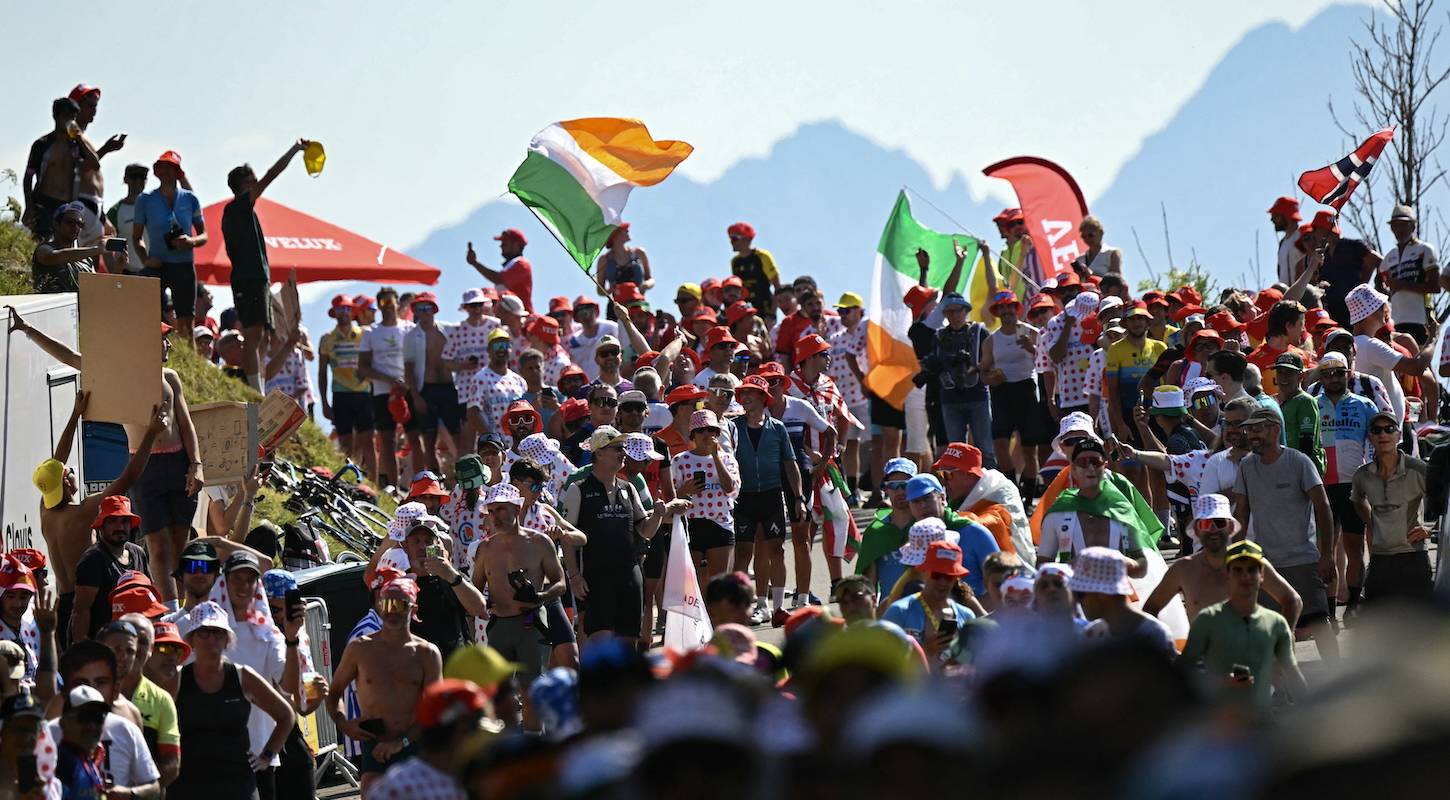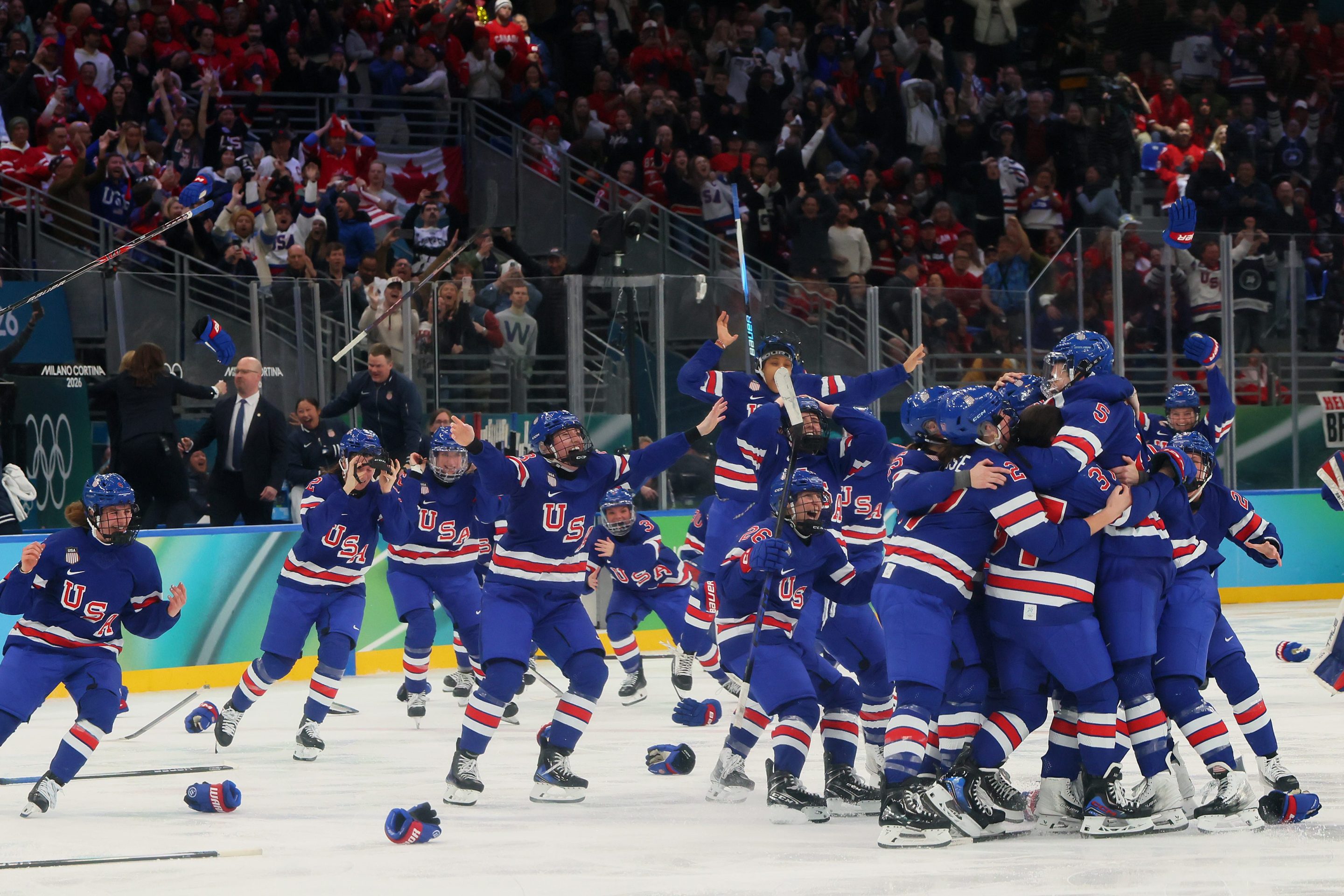VAISON-LA-ROMAINE, France — On the morning of Stage 15 of the Tour de France, I was strolling the paddock with a colleague when we happened upon the fan who had her cardboard signed turned into jersey fluff by Julian Alaphilippe on the top of the Tourmalet. Clara came from Barcelona to watch the Tour, cheer for her favorite rider, and cheekily propose holy matrimony to him via cardboard sign. "I wanted him to read it quickly, because he is tired," she said. Did she think it would work? "No, I don’t think so, but I have to try." Her first language is Spanish, she told me in English, and she wrote her sign in Dutch. Asked in French if she spoke Dutch, she said no, she had to work out the translation.
Any given exchange at the Tour might involve this amount of translingualism. I have talked to Belgians in Spanish and Norwegians in English, and have tried and failed to talk to anyone in French, often resorting under duress to a dogmouthed combination of the three. Still, I have been surprised at how easy it's been to get around with only English and Spanish. The Tour itself is conducted in French and English, though obviously French takes precedence. Official communiques are issued first in French, race radio is mostly in French, and the English translations have a charming clunkiness.
While the Tour carries its haughty Frenchness like a badge of honor, one of the distinguishing traits of cycling is how international it is. This is most clearly expressed in the polyglot character of the sport generally and the Tour specifically, a refreshing contrast from the strident monolingualism of the United States. Riders from 27 countries are here, and seven different mother tongues are represented in the current top 10. Fans from all around the world flock to the sides of roads to wave flags and hold signs written in Basque, Danish, and Estonian. Amid all this diversity, English exudes its homogenizing pressure.
One line of inquiry I pursued was to ask as many people as possible how many languages they speak. Every rider I've interacted with or asked about is at least bilingual; the majority of the trilingualists spoke English and French plus their native tongue, be that German, Dutch, or Slovenian. "It’s an international business, so you have to speak many languages," a Visma soigneur told me, amid a conversation conducted with a Belgian family in Dutch. He spoke English, German, and Dutch, and was working on his Italian, Spanish, and French.
The highest number I heard from anyone was eight, an honor that goes to EF Education-EasyPost head sports director Charly Wegelius, whom I caught up with outside the EF bus. He had just finished an interview with Italian TV. Wegelius was born in Finland, grew up in Yorkshire, and raced as a professional in Italy, Belgium, and France. He told me he speaks English, Italian, French, Swedish, Spanish, and some "reasonable German," and can understand Dutch and Finnish, though he said he is not fluent. He joked about a former Italian colleague getting a job in the peloton for which English fluency was a requirement. "But you can't speak English," Wegelius said he told his friend, to which they replied, "Yeah, I'll figure that out." He also told me that he asked his children whether they spoke Finnish, to which they said no. Watching Finnish TV together a few minutes later, he asked them what was happening, and they were following everything.
Wegelius started learning Italian when he was 20. "When I went to Italy, I didn't speak a word of Italian," he said. "There was no internet, nothing in English, so it was full-on immersion. And I can remember not knowing Italian, and I can remember knowing it, but I can't remember what happened in between."
The last part of that answer is particularly fascinating, and exposes the limits of my line of questioning. "How many" assumes a false binary between speaking and not speaking a language. A beauty of language is how squishy its borders are. A language is not a series of mechanical parts that you learn how to assemble by rote until you have created a cohesive, featureless whole; rather, it is a flow, a process of concretizing abstractions. Anyone can ride along down the stream for as long or as short of a time as they want, and fluency is foremost the ability to flow along with the current with as little resistance as possible, moving along the natural course of thought. What Wegelius did in Italy was hop in the river and tumble around until he learned to swim.
That's not entirely uncommon. Most riders in the peloton are actively working on one language or another. Wegelius said that of his riders, he thought Mikkel Honoré, a Dane, was probably the most multilingual. Honoré's English is still imprecise, however, and while EF is an American team with a largely Anglophone support staff, he can't communicate at the very nuanced level he wants to. A support staffer said that he didn't really know anything about Honoré until they both started speaking Italian, which is neither's first language but is a level playing field. From that point, he said he finally got to meet Honoré.
I've felt the same way. In the Pyrenees, a good number of people speak Spanish as a second language, which meant we could communicate on the same level. On my way over to the Aure valley from the Peyragudes, I picked up a family of four hitchhiking tourists. They were French, but knew roughly the same amount of Spanish as I did. They were big Carlos Alcaraz fans, and thought Jonas Vingegaard could make a comeback. It was not precise, but precision is rarely the point of language.
In Yoko Tawada's recent Exophony, she writes of this phenomenon:
If a writer, decides to write in a particular language, they are under no obligation to use that language in the same way that the majority of its speakers use it. What's more important is that they uncover some latent potential in the language, which no one had noticed before. Venturing outside of one's mother tongue is one strategy for revealing the possibility or impossibility of a given linguistic expression.
The point is not that I broke new linguistic ground with the hitchhikers, but that expression through a new language can't be thought of in terms of correct and incorrect. In the interstitial gaps between languages, what Tawada calls "the poetic ravine," new connections, modes of thinking, and expressions can emerge. The Tour de France is a perfect site for this sort of exchange, because of its decidedly international character. Everyone is here, trying to communicate in their own ways, and often succeeding to beautiful effect.
Which makes the rise of English in the peloton somewhat of a bummer. Everyone agreed: English is becoming far more popular year by year, with more and more teams conducting their business in English, including both UAE and Visma. "It's so different from 20 years ago," Wegelius said. "When I was racing, I could go a long time without speaking English." Now, so many more young people grow with the understanding that English is an important language to learn, so riders and staffers come into the sport already knowing it. There's a positive feedback loop, a self-accelerating cycle. This isn't specific to cycling, of course, though few other areas of culture are or have been this stubbornly multilingual.
What is lost with linguistic homogeneity? More people can communicate, yes, but fewer people having to communicate across the poetic ravine means cleaner exchanges and fewer opportunities for novelty.






